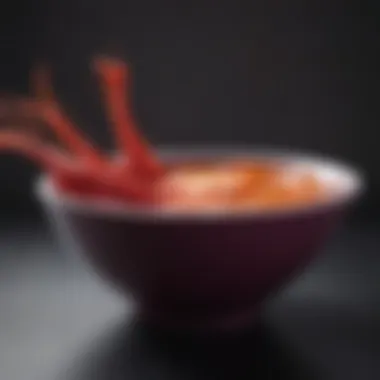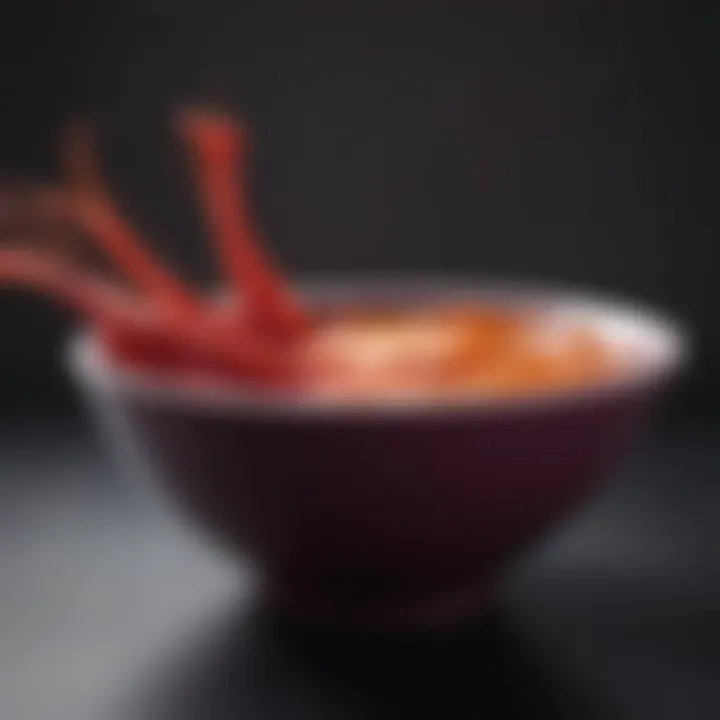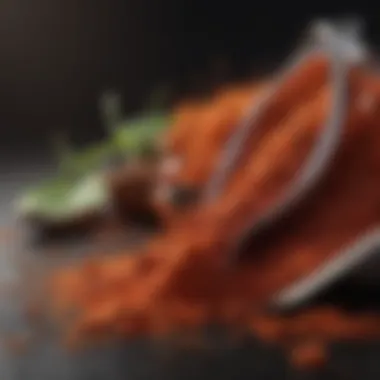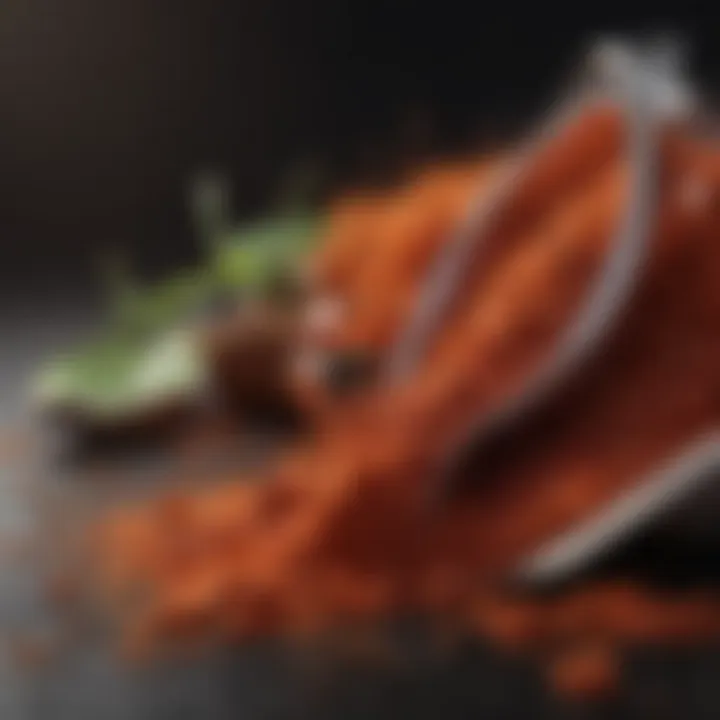Does Vegan Hair Dye Harm Your Hair Health?


Intro
The conversation around hair dye has evolved significantly in recent years, particularly with the rise of vegan hair dyes. Many individuals are curious about whether these products are less damaging than traditional ones. Understanding the formulation of vegan hair dyes can lead to more informed choices about hair health. This article will dissect the ingredients, possible effects, and contrasting views between traditional and vegan dyes.
The relevance of choosing the right hair dye goes beyond personal style. Hair health is crucial for many women. It affects confidence, appearance, and even perceptions in social interactions. In the quest for vibrant hair color, it is vital to consider how these products impact hair texture and overall integrity.
Fashion Trends
When it comes to hair, seasonal trends can sway choices. Many women look at what is current in fashion magazines or on social media platforms. Vegan dyes have found their place in popular culture as eco-friendly options. This section explores how trends in hair color are influenced by Vegan movements.
Seasonal Styles
Different seasons bring variations in hair color. In spring and summer, brighter shades like pastel pinks or vibrant blues often become more popular. Vegan dye brands, such as Gothic Beauty and Arctic Fox, frequently release seasonal collections that align with fashion trends. These collections encourage a playful approach to color without the worry of harmful chemicals.
In autumn and winter, many opt for deeper, richer hues like burgundy or dark chocolate. Vegan dyes allow for these shifts while potentially being easier on the hair due to their more natural compositions. Thus, seasonal styles can help consumers recognize the versatility of vegan hair dye options.
Influencer Inspirations
Social media influencers serve as significant trendsetters in the realm of hair dye. Many beauty influencers have endorsed vegan products, showcasing how vibrant colors can be achieved without compromising hair health. For example, popular Instagram personalities often share their hair transformations using brands like Overtone and Lime Crime. These experiences highlight the rise of vegan dyes in regard to aesthetic, drawing in a large audience that values both appearance and ethics.
Beauty Tips
Taking care of hair is essential, especially when using any dye. Here are some tips for maintaining hair health while exploring various hair colors.
Skincare Routines
Many myths suggest that hair dyes are uniformly harsh. It is essential to establish a routine that nourishes hair post-treatment. Some suggestions include:
- Use sulfate-free shampoos, as they can be less drying and help retain moisture.
- Condition regularly after dyeing, focusing on deep conditioners that serve to restore hydration.
- Limit washing frequency to maintain color vibrancy longer.
Makeup Techniques
Aligning hair color with makeup is crucial for a cohesive look. Soft, earthy tones in makeup often complement pastel shades well. A natural look can draw attention to bright hair colors without overwhelming the overall aesthetic. Choosing the right lip color can also enhance the new hair dye, creating balance in appearance.
Product Reviews
In the market for hair care, a variety of vegan dyes exist. Comparing products helps consumers make informed decisions.
Trending Products
Some notable vegan hair dyes include:
- Manic Panic - Known for its vivid shade range and conditioning properties.
- Naturtint - Prized for its semi-permanent formulas that are free from ammonia.
- Herbatint - A favorite for those seeking a more gentle formulation that does not compromise on richness.
Comparison Guides
Evaluating these options leads to important considerations, such as:
- Ingredients: Vegan dyes often contain fewer harsh chemicals, which can lead to healthier hair.
- Color longevity: Some brands provide longer-lasting color than others, important for frequent color changers.
- User Experience: Reviews from consumers often highlight both satisfaction and dissatisfaction, helping new users find what suits them best.
By synthesizing this information, potential users of vegan dyes gain a comprehensive view into how these choices impact their hair and their overall beauty routine. The key is to find a product that aligns with personal values and desired outcomes.
Prologue to Vegan Hair Dye
Understanding vegan hair dye is crucial for those mindful of their hair health and ethical choices. As consumers become more aware of how beauty products affect both personal health and the environment, the demand for vegan alternatives has surged. This section will elucidate what vegan hair dyes are, how they differ from traditional options, and why this matters in conversations about hair care and ethical beauty.
Defining Vegan Hair Dye
Vegan hair dye is formulated without any animal-derived ingredients. This means no use of substances like keratin, beeswax, or carmine, which are common in many conventional dyes. Instead, such products use plant-based ingredients and synthetic components that meet cruelty-free standards. The process of defining vegan hair dye often includes scrutiny of the sourcing and testing of each ingredient, ensuring that there are no harmful practices involved.
Many consumers gravitate towards vegan hair dyes for ethical reasons, believing their choices contribute to reducing animal suffering. However, the definition encompasses not just the ingredients, but also the overall impact on areas such as sustainability and environmental protection.
Growth of Vegan Hair Products


The market for vegan hair products, including dyes, has seen significant growth in the past decade. This can be attributed to several factors:
- Increased Awareness: More consumers are educated about the ethical implications linked to cosmetic products.
- Sustainability Movement: There's a broader emphasis on environmentally friendly products overall.
- Health Consciousness: People are increasingly concerned about the effects of chemicals in their beauty products on their bodies and health.
This growth is evident through the expanding range of brands and products available. Companies now innovate to create vegan dyes that not only align with ethical standards but also promise to nourish and protect hair. Consumers can find options tailored for various hair types and desired colors, reflecting the shift toward choices that prioritize both health and ethics. The popularity of vegan hair dye is likely to continue rising as consumers seek options that align with their values and meet their beauty needs.
Ingredients in Vegan Hair Dye
The ingredients in vegan hair dye are crucial for understanding how they affect hair health. Vegan dyes often rely on plant-based components that are considered gentler compared to chemicals found in traditional dyes. This section aims to clarify what typically goes into vegan hair dye formulations.
Common Components
Vegan hair dyes commonly include several key ingredients. These components often feature natural plant extracts, essential oils, and minerals. For example, beet juice, henna, and indigo powder are frequently found in these formulations. These ingredients work in various ways, providing color while minimizing damage to the hair.
Natural plant extracts serve as the foundation for many vegan dyes, providing both color and nourishment. They have antioxidant properties that can help in protecting the hair from environmental stressors. This is beneficial especially for those seeking a healthier alternative to traditional dyes.
Essential oils contribute not only scent but also conditioning properties. For instance, argan oil can help in moisturizing and softening the hair, reducing the potential for dryness and damage often associated with hair coloring.
Moreover, minerals, such as manganese or copper, may be included to promote the overall health of the hair. These can support the structural integrity of the hair, making it more resilient during and after the dyeing process.
In summary, most vegan hair dyes prioritize natural ingredients that aim to provide color without compromising hair health.
Comparative Analysis with Traditional Dyes
The comparison of vegan hair dye ingredients to traditional hair dyes underscores significant differences. Traditional dyes often contain harsh chemicals such as ammonia and parabens. These substances can lead to various forms of hair damage, including dryness and breakage. In contrast, the natural ingredients found in vegan dyes aim to avoid such outcomes.
- Chemical Composition:
Traditional dyes usually rely on synthetic compounds, which can destabilize the hair's natural balance. In contrast, vegan dyes focus on plant-based components that are typically gentler. - Gentler Application:
Users of vegan hair dyes often report a more pleasant application experience. The absence of potent chemicals can mean less irritation on the scalp, allowing for a more comfortable dyeing process. - Long-Term Effects:
Regular use of traditional dyes can lead to cumulative damage over time. Conversely, the natural formulations of vegan dyes can support better hair quality with less frequent side effects.
While some consumers may be skeptical about the effectiveness of vegan dyes, the growing body of evidence supports the notion that these dyes can be both effective and safer for long-term hair health. It is essential for users to evaluate their specific hair needs and choose products accordingly.
Understanding Hair Damage
Understanding hair damage is fundamental to any discussion regarding hair care, especially when it comes to coloring with vegan hair dyes. Hair damage occurs in various forms, and knowing its intricacies helps consumers make better-informed choices about products they use. This section will lay the groundwork for how different factors affect hair integrity and the specific role hair dyes play in that equation.
Types of Hair Damage
Chemical Damage
Chemical damage arises when hair undergoes processes that alter its natural structure. This kind of damage often results from harsh ingredients commonly found in many hair products, including dyes. Vegan hair dyes aim to provide a gentler alternative, focusing more on natural ingredients. However, even vegan dyes can contain substances that may strip away the hair's natural oils or weaken its structure over time.
One key characteristic of chemical damage is its cumulative effect. Frequent use of any kind of hair dye can lead to weakened hair. This makes it essential to assess the ingredients in vegan hair dyes, as they may still pose risks despite being plant-based. The main advantage is that these products often contain fewer harsh chemicals when compared to traditional dyes. Though it is beneficial to consider these elements, it does not eliminate the need for caution with all dye applications.
Physical Damage
Physical damage pertains to damage caused by external forces, such as excessive heat from styling tools, rough handling during brushing, or exposure to harsh environmental factors. This type of damage is crucial for the overall health of hair, as it can lead to split ends and breakage. People who frequently dye their hair may overlook the significance of how their hair is treated before and after dyeing.
The key characteristic of physical damage is its direct relation to daily routines. For instance, someone using a flat iron daily will likely see more physical damage, irrespective of the dye used. The drawback is that individuals may not be aware of how their styling habits contribute to the overall state of their hair. Therefore, protecting hair through proper techniques becomes vital when dyeing hair, even with vegan options.
Environmental Damage
Environmental damage results from factors such as pollution, UV rays, and humidity. Each of these elements can weaken hair over time, leaving it dry or brittle. The importance of recognizing environmental damage cannot be overstated, as it balloons when combined with chemical and physical stressors.
A unique aspect of environmental damage is its often unnoticed impact on hair performance. The harsh components in the outer environment can lead to struggles in maintaining shine and strength in hair, and this can compound the effects of hair dye treatments. Thus, understanding this risk is critical for anyone who colors their hair, as it factors into the overall health of the hair.
How Hair Dye Contributes to Damage
Hair dye, whether vegan or traditional, directly influences hair health. The process of dyeing inherently requires some level of alteration to the hair's structure. Understanding this relationship helps contextualize how varying dye formulations affect hair integrity. For example, while well-formulated vegan dyes may be comparatively gentler, mishandling during the application or neglecting post-dye care can still lead to observable damage.
It is essential to balance the desire for color with the actual state of hair health. Regaining and maintaining good hair health requires diligence and knowledge about the products and practices in use.
Anyone considering a transition to vegan hair dye should weigh its potential effects carefully but also understand that it's only one piece of a larger puzzle. Thus, ongoing care and mindful use of products and techniques are crucial for achieving the best results.
Effect of Vegan Hair Dye on Hair Health
The exploration of vegan hair dye and its effects on hair health is a significant focus within this article. Consumers are becoming increasingly aware of the products they apply to their bodies and the potential repercussions on their health. Unlike traditional hair dyes, which often contain harsh chemicals, vegan hair dyes offer an alternative perceived as safer and more nourishing. However, understanding their actual implications on hair integrity is crucial.


Considering the rise in demand for cruelty-free and plant-based products, it is imperative to discuss the specific elements that characterize these dyes. Factors such as the dye’s formulation, ingredient source, and chemical properties determine how they interact with hair strands. Vegan hair dyes can still contain components that might cause damage or alterations over time, just like conventional dyes. Therefore, assessing their impact on hair health is essential to making informed decisions.
Research Findings on Hair Integrity
Research in the field of hair care has consistently evaluated the relationship between dye formulations and hair integrity. Various studies indicate that vegan hair dyes, typically formulated with plant-based ingredients, may be gentler compared to traditional products. Ingredients such as fruit and vegetable extracts can provide moisture and minimize damage.
However, the effectiveness and safety of these products depend on the specific formulation used. Some vegan dyes might include alcohol or other preservatives, which can be drying. A study published in the Journal of Cosmetic Science found that while certain vegan dyes showed lower levels of damage, others had similar effects to their chemical counterparts. This suggests that not all vegan hair dyes are created equal and highlights the importance of analyzing individual products for their performance on hair health.
User Testimonials and Reviews
Personal experiences from users can offer insight into the effectiveness and safety of vegan hair dyes. Reviews often reflect a broad range of opinions, and many users report positive outcomes. Women of various ages have shared their experiences, with many praising the nourishing qualities of these products. Users often highlight improvements in hair softness and vibrancy after switching to vegan options.
Conversely, some testimonials reveal dissatisfaction or unexpected results. Instances of hair dryness or fading color have been mentioned, showing that outcomes can vary significantly. User reviews frequently emphasize the following points:
- Quality of Ingredients: Many customers look for transparency regarding ingredient origins.
- Color Retention: Users often discuss how long the color lasts compared to traditional dyes.
- Sensitivity Issues: Some users mention allergic reactions or sensitivities, even with vegan formulas.
"Switching to vegan hair dye has transformed my hair’s health. I’ve noticed less breakage and more shine over time," says a frequent user from a popular hair care community.
It is clear that while many women appreciate the use of vegan hair dye, experiences differ widely. Therefore, thorough research into individual products and reading reviews can be beneficial for women of all ages looking to maintain healthy hair while considering their environmental impact.
Myths and Misconceptions
The topic of myths and misconceptions surrounding vegan hair dye is crucial to understanding its impact on hair health. Many consumers hold preconceived notions about vegan products based on limited knowledge or misinformation. This section aims to clarify these misunderstandings. Recognizing the myths can lead to more informed choices, ultimately benefiting hair care routines. Addressing these common beliefs enhances the article's overall goal of providing insight into the effects of vegan hair dye.
Common Myths about Vegan Dyes
Several myths circulate about vegan hair dye that may mislead consumers. Here are the most prevalent misconceptions:
- Vegan Dyes are Completely Natural: Many believe that since vegan dyes avoid animal products, they are also free from synthetic ingredients. This is not necessarily true. Vegan formulations might still contain chemical components that can affect hair health.
- Vegan Dye Always Provides Gentle Results: While many vegan dyes claim to be less damaging, this does not mean they will not affect hair at all. Factors such as individual hair type and prior treatments can alter how a dye interacts with hair.
- All Vegan Hair Dyes are Same: Not every vegan dye is formulated with hair health in mind. There is a broad spectrum of quality within vegan products. Some may contain harmful chemicals, thus leading to damage.
- Vegan Dyes Don't Lighten Hair: Another common myth suggests that vegan dyes cannot lighten hair. However, many brands create vegan formulations that effectively lift hair color but may still incur damage depending on the process.
Recognizing these myths is important for consumers who want to make educated decisions when choosing hair dye products.
Debunking Misconceptions
Debunking these misconceptions provides clarity about vegan hair dye. Let's explore the truths behind the myths:
- Not All Ingredients Are Natural:
- Gentleness is Relative:
- Quality Varies Across Brands:
- Lightening is Possible:
- Many vegan hair dyes include synthetic chemicals like PPD (p-phenylenediamine) or resorcinol, which can lead to allergic reactions or hair damage. Consumers must read ingredient labels carefully.
- The effectiveness of a vegan dye heavily relies on the individual's hair condition. A sensitive scalp or damaged hair may react differently compared to healthier strands. Thus, results can vary widely.
- It is crucial to research brands. Some vegan dyes prioritize a natural approach, with safer ingredients. Conversely, others might not. Consumer reviews and ingredient transparency should guide choices.
- Vegan hair dyes can effectively lighten hair under the right conditions. However, this usually involves a stronger processing agent that comes with the risk of damage.
Through debunking these misconceptions, consumers can gain a comprehensive understanding of what vegan hair dye offers. It is about balancing ethical choices with hair health.
Tips for Minimizing Damage
When considering the use of vegan hair dye, it is crucial to understand the potential implications for hair health. This section provides important strategies that can help mitigate damage while still allowing individuals to explore vibrant hues and maintain hair integrity. Minimizing damage involves both pre-dye preparations and diligent post-dye care. These practices not only enhance the longevity of color but also protect the hair from possible adverse effects associated with the dyeing process. Let’s delve into two critical phases: pre-dye hair care and post-dye maintenance, focusing on their benefits and necessary considerations.
Pre-Dye Hair Care
Effective pre-dye care sets the foundation for a successful dyeing experience. Before applying vegan hair dye, it is advisable to prepare your hair properly. This preparation can strengthen hair, making it more resilient to any chemical interactions that may occur during the dyeing process.
- Hydration: Ensuring hair is well-hydrated is key. Use deep conditioning treatments a week prior to dyeing. Ingredients like aloe vera and coconut oil can significantly enhance moisture retention.
- Avoid Heat Styling: Reduce or eliminate the use of heat styling tools for a few days before dyeing. Heat can compromise hair structure, making it more susceptible to damage during the coloring process.
- Clarifying Shampoo: Consider using a clarifying shampoo one to two days before dyeing. This can remove product buildup and create a clean slate for better dye penetration.
- Protein Treatments: For those with fine or damaged hair, a protein treatment can be beneficial. This helps rebuild the hair structure and can minimize damage from the dye.
- Trim Split Ends: Trimming your hair helps to eliminate split ends, ensuring that the dye can be applied more evenly and reducing the likelihood of further breakage.
Post-Dye Hair Maintenance
Once the dye has been applied, the next step is to care for the newly colored hair. Proper post-dye maintenance is essential for preserving color vibrancy and maintaining hair health. Here are several effective strategies:
- Use Sulfate-Free Shampoo: Transition to a sulfate-free shampoo. This type is gentler on color-treated hair and helps in preserving the dye longer.
- Cold Water Rinse: Rinsing hair with cold water can help seal the hair cuticle, preserving color while preventing moisture loss.
- Condition Regularly: Regular conditioning treatments keep hair hydrated and can prevent it from becoming dry and brittle after dyeing. Look for conditioners specifically designed for color-treated hair.
- Limit Washing Frequency: Reducing the frequency of hair washing can prolong the life of hair dye. Less washing means less stripping of the color.
- Protect from Sun Exposure: UV radiation can fade hair color. When spending time outdoors, consider wearing a hat or using hair products with UV protection.
"Pre-dye and post-dye care can make a significant difference in the health and appearance of colored hair. A little effort goes a long way."


By taking these steps seriously, individuals can enjoy vibrant, healthy hair while mitigating the potential damage associated with vegan hair dye. Careful planning and diligent maintenance are the pillars of successful hair coloring.
Alternatives to Vegan Hair Dye
Exploring alternatives to vegan hair dye is crucial for consumers looking to make informed choices about their hair care. While vegan dyes are celebrated for their ethical considerations and often perceived as safer options, other alternatives exist that may align more closely with individual needs and preferences. Understanding these options can aid in selecting a product that not only reflects one’s values but also accommodates personal hair health goals.
Natural Hair Dyes
Natural hair dyes are derived from plant-based sources and minerals. They often include ingredients such as henna, indigo, and various herbal concoctions. One of the significant benefits of natural dyes is their lower likelihood of causing chemical damage to the hair or scalp. These dyes do not contain harsh chemicals like ammonia or peroxide, which are prevalent in many conventional hair color products.
Moreover, natural hair dyes can also nourish the hair. For instance, henna is known to improve hair strength and add moisture. Here are a few key points about natural hair dyes:
- Safety: Generally, they have fewer side effects and allergic reactions compared to synthetic products.
- Color Variety: Although the palette may be more limited, colors can be mixed to achieve various shades.
- Longevity: Natural dyes may not last as long as their chemical counterparts, requiring more frequent applications.
In opting for natural dyes, consumers must also be aware of potential challenges, such as achieving the desired shade, as the results may vary based on the natural hair color. This variability can sometimes lead to less predictable outcomes.
Non-Vegan Options
Non-vegan hair dye options primarily include traditional hair coloring products that often contain a myriad of synthetic chemicals. Brands like L'Oréal and Clairol, among others, utilize compounds which may not be present in vegan alternatives. While effective in achieving vibrant and long-lasting results, there are considerations regarding their ingredients.
A few notable characteristics of non-vegan hair dye include:
- Strong Color Payoff: They can offer a wider range of colors and may achieve desired shades more reliably than natural dyes.
- Formulation Strength: These products often have higher durability, meaning they can withstand washing and fading over time.
- Potential Damage: The presence of harsh chemicals such as ammonia and sulfates can lead to damage over time.
While many individuals achieve satisfactory results from non-vegan dyes, consumers must consider the potential long-term effects on their hair health. Those with sensitive skin or allergies might need to be especially cautious.
In deciding between vegan and non-vegan options, it is key to assess individual hair needs and values. Each choice presents a distinct set of pros and cons, emphasizing the importance of understanding how ingredients impact both personal ethics and hair health.
As the market continues to evolve, embracing alternatives to vegan hair dye can provide consumers with various avenues to explore, ensuring they find the best solution for their unique hair requirements.
Professional Opinions and Insights
Understanding the perspectives of professionals in the field of hair styling and dermatology is crucial in evaluating the implications of vegan hair dye on hair health. Expertise from hair stylists and dermatologists not only sheds light on the efficacy and safety of these products but also highlights potential issues that consumers may face. Their insights provide a more nuanced understanding of how these dyes interact with hair structure and scalp health, giving consumers the knowledge necessary to make informed decisions.
Expert opinions often draw from years of experience and observation of hair dye on various hair types over time. This firsthand knowledge can be invaluable. Professionals can articulate aspects such as how vegan ingredients behave compared to their traditional counterparts, how they affect color retention, and what precautions may be required for optimal results. Moreover, the impact of these dyes on different hair textures and conditions is also a critical factor.
Expert Hair Stylists' Views
Expert hair stylists generally recognize the rise in demand for vegan products as part of a larger trend towards sustainability and health-conscious choices. They note that many vegan hair dyes avoid harsh chemicals like ammonia, parabens, and sulfates. This can lead to a gentler application for individuals with sensitive scalps or pre-existing hair damage.
Some stylists emphasize that while vegan dyes can be healthier, the effectiveness varies. For instance, certain vegan formulations may require a longer processing time or multiple applications to achieve desired shades. This requires careful consideration by users to manage their expectations regarding results. They recommend conducting patch tests to ensure compatibility with individual hair types, mitigating the risk of adverse reactions.
In addition, stylists point out that not all vegan dyes are created equal. Some brands utilize high-quality natural ingredients, while others may rely on fillers that do not provide the same benefits. Stylists suggest doing thorough research and choosing reputable brands based on ingredient transparency and sustainability practices.
Dermatological Perspectives
Dermatologists often express concerns related to hair dye, regardless of whether it is vegan or traditional. From a skin health perspective, they focus on the composition of hair dyes and their potential effects on scalp health and hair integrity.
Vegan hair dyes typically use natural plant-based ingredients, which are often gentler than synthetic alternatives. This can reduce the likelihood of allergic reactions or irritations in some individuals. However, dermatologists remind consumers that natural does not always equal safe. Certain natural substances can still provoke sensitivities.
Another consideration is the potential staining and buildup on the scalp, which can occur with most dyes, including vegan options. Dermatologists recommend thorough cleansing techniques post-application to avoid prolonged exposure to any remaining dye, which could lead to scalp issues,
"Careful consideration of the ingredients and their effects is essential when selecting any hair dye. Consulting with professionals can provide guidance on the safest and most effective choices."
In summary, both hair stylists and dermatologists underscore the importance of professional guidance when exploring vegan hair dye options. Their insights offer not only practical advice but also a deeper understanding of the potential impacts on hair and scalp health, enabling consumers to make better-informed decisions.
Epilogue
The examination of vegan hair dye and its potential effects on hair health is crucial for informed decision-making among consumers. In the current landscape of beauty products, where there is a growing demand for environmentally friendly and cruelty-free options, understanding the implications of these choices has never been more essential. Consumers wish to enhance their appearance without compromising the integrity of their hair. Therefore, this section focuses on summarizing key insights regarding the damage, benefits, and overall safety of vegan hair dyes.
Summary of Findings
Research indicates that vegan hair dyes often utilize natural or plant-derived ingredients, reducing the risk of harmful chemicals that are prevalent in traditional hair dyes. Consumers report varied experiences, with many noting that vegan options can be less damaging and more nourishing for hair. However, there are still factors that can contribute to hair damage, regardless of dye type, including the application process and individual hair type. It is also notable that while vegan dyes are generally safer, the results can vary based on brand formulation and the specific products used.
Recommendations for Consumers
To navigate the world of hair dye, here are some recommendations:
- Research Brands: Look into different vegan hair dye brands and their ingredient lists. Check for reviews and consumer testimonials to gauge effectiveness and safety.
- Patch Test: Always conduct a patch test before applying any hair dye to minimize the risk of allergic reactions.
- Consult Professionals: If in doubt, consulting with a professional stylist can provide insights tailored to your hair type and preferences.
- Maintain Hair Health: Before and after dyeing, prioritize a hair care regimen that nourishes and strengthens hair, using masks and conditioning treatments.
- Know Your Hair Type: Understand how your specific hair type reacts to different dyes to make the most informed decision possible.
By considering these factors, consumers can enhance their beauty routines while minimizing potential damage to their hair. This approach leads to a healthier, more informed choice in the realm of hair care.



